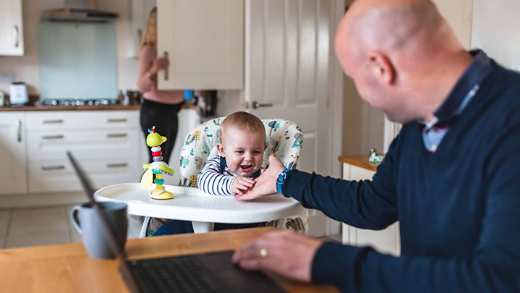Putting your life insurance in trust could help your loved ones when you’re gone. Less tax and a quicker pay out being just two good reasons. So, should you consider it?
You might not want to think about what happens after you’re gone. But what’s certain is you’ll want to help make sure the people you leave behind are looked after, financially speaking. If the worst does happen, your life insurance could pay out a cash lump sum to your loved ones.
However, putting - or 'writing' - your life insurance policy in trust means having more control over who benefits from that pay out. It could also help reduce the chance of an inheritance tax bill and it'll speed up how quickly the money's released.
Here’s how.
What is a trust?
A trust is a legal arrangement that allows you to leave money and things you own (your 'assets') to a person or people (the ‘beneficiaries’) when you die. A trust can be managed by family, friends or a solicitor (the ‘trustees’). All your assets put together form your ‘estate’.
Your life insurance is an asset and can be put into a trust in the same way as anything else.
Why should you put your life insurance in trust?
Choosing to put life insurance in trust is a popular option. Benefits include:
Control – putting your life insurance in trust means you get to define who benefits from what you leave behind and who you'd like to manage it.
Speed – probate is the process of dividing up your assets after you die and can take months to complete. If your life insurance is in trust, your loved ones don’t have to wait for probate for the policy to pay out – usually your trustee just needs your death certificate. However, they may have to apply for probate for other assets in the estate.
Tax – if your total estate, which includes your life insurance, is worth more than £325,000, there may be a 40% inheritance tax bill to pay on the part over and above that amount. Putting your life insurance in trust means it’s legally owned by your trustees and isn’t part of your estate. This means it doesn’t count towards that £325,000, and that means your loved ones get the full pay out.
What are the downsides of setting up a trust?
Although there are benefits to setting up a trust, it might not be the best thing for you. It’s a legal arrangement and you should think carefully before signing up.
A trust has legal and tax implications and once it’s set up you can’t just change your mind and cancel it.
Remember that you’re handing over legal ownership of your life insurance policy to someone else – your trustee(s). This can’t be reversed.
The best thing is to get independent financial and legal advice before you start. Try unbiased.co.uk or lawsociety.org.uk for help with this.
What sort of trusts are there?
There are a few different types of trust. The differences between them largely come down to how much flexibility there is to change stuff. Which is right for you depends on the type of life insurance you have and who you’d like to benefit from a pay out.
For example, a ‘flexible’ trust allows you to name a number of people as potential beneficiaries, and add to that list as things change, eg as grandchildren are born after the trust is set up.
By contrast, with an ‘absolute’ or ‘bare’ trust, beneficiaries can’t be changed.
A ‘survivor trust’ might fit the bill if you have a joint life insurance policy. In this case, the trustees pay any money to your surviving partner (as long as they’re still alive 31 days after your death), which is reassuring if you’re not married or in a civil partnership.
How to put your life insurance in trust
Your first step is to make sure it’s the right thing for you. Remember to get independent financial and legal advice before going ahead.
Otherwise, it’s usually a pretty simple process and can be done any time.
If you’re thinking of doing it when you buy your life insurance, have an idea of who you’d want as your trustees before you start. If you want to put an existing policy in trust, you might need a financial adviser or a solicitor’s help and bear in mind that might cost.
Start by having a look at our all-you-need-to know info on trusts.








